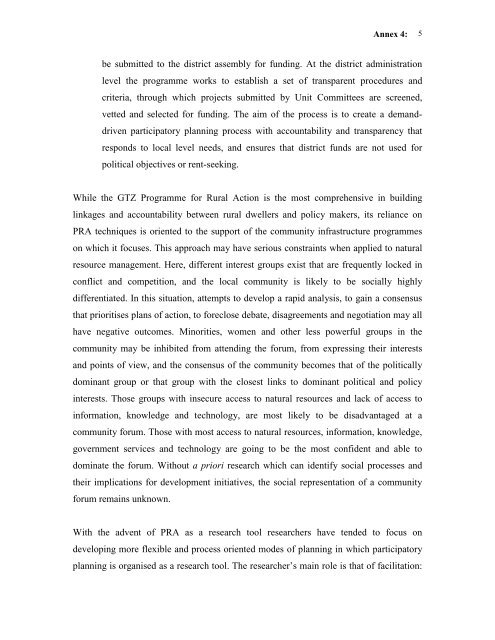Poverty Dimensions of Public Governance and Forest Management ...
Poverty Dimensions of Public Governance and Forest Management ...
Poverty Dimensions of Public Governance and Forest Management ...
Create successful ePaper yourself
Turn your PDF publications into a flip-book with our unique Google optimized e-Paper software.
Annex 4: 5<br />
be submitted to the district assembly for funding. At the district administration<br />
level the programme works to establish a set <strong>of</strong> transparent procedures <strong>and</strong><br />
criteria, through which projects submitted by Unit Committees are screened,<br />
vetted <strong>and</strong> selected for funding. The aim <strong>of</strong> the process is to create a dem<strong>and</strong>driven<br />
participatory planning process with accountability <strong>and</strong> transparency that<br />
responds to local level needs, <strong>and</strong> ensures that district funds are not used for<br />
political objectives or rent-seeking.<br />
While the GTZ Programme for Rural Action is the most comprehensive in building<br />
linkages <strong>and</strong> accountability between rural dwellers <strong>and</strong> policy makers, its reliance on<br />
PRA techniques is oriented to the support <strong>of</strong> the community infrastructure programmes<br />
on which it focuses. This approach may have serious constraints when applied to natural<br />
resource management. Here, different interest groups exist that are frequently locked in<br />
conflict <strong>and</strong> competition, <strong>and</strong> the local community is likely to be socially highly<br />
differentiated. In this situation, attempts to develop a rapid analysis, to gain a consensus<br />
that prioritises plans <strong>of</strong> action, to foreclose debate, disagreements <strong>and</strong> negotiation may all<br />
have negative outcomes. Minorities, women <strong>and</strong> other less powerful groups in the<br />
community may be inhibited from attending the forum, from expressing their interests<br />
<strong>and</strong> points <strong>of</strong> view, <strong>and</strong> the consensus <strong>of</strong> the community becomes that <strong>of</strong> the politically<br />
dominant group or that group with the closest links to dominant political <strong>and</strong> policy<br />
interests. Those groups with insecure access to natural resources <strong>and</strong> lack <strong>of</strong> access to<br />
information, knowledge <strong>and</strong> technology, are most likely to be disadvantaged at a<br />
community forum. Those with most access to natural resources, information, knowledge,<br />
government services <strong>and</strong> technology are going to be the most confident <strong>and</strong> able to<br />
dominate the forum. Without a priori research which can identify social processes <strong>and</strong><br />
their implications for development initiatives, the social representation <strong>of</strong> a community<br />
forum remains unknown.<br />
With the advent <strong>of</strong> PRA as a research tool researchers have tended to focus on<br />
developing more flexible <strong>and</strong> process oriented modes <strong>of</strong> planning in which participatory<br />
planning is organised as a research tool. The researcher’s main role is that <strong>of</strong> facilitation:
















